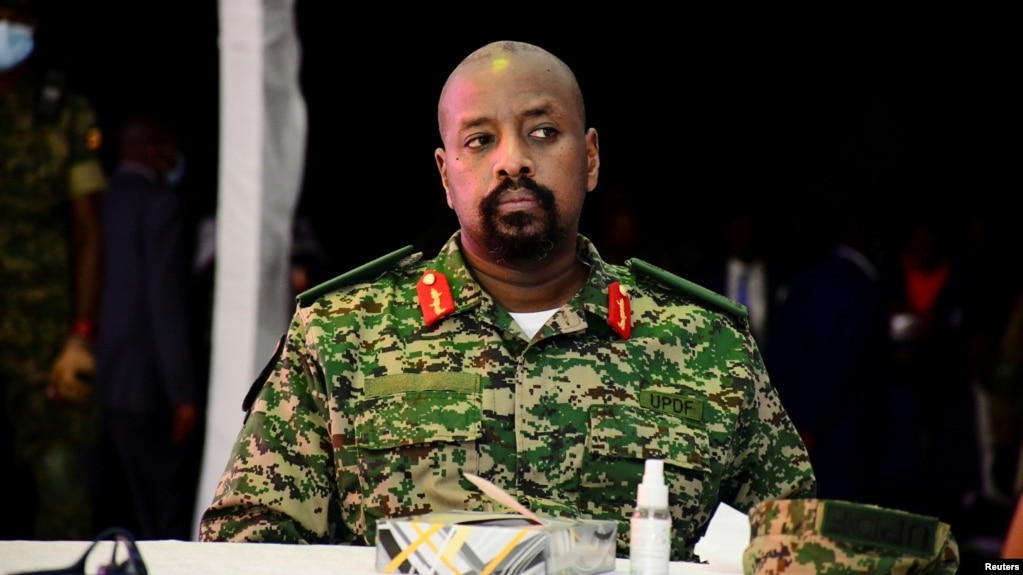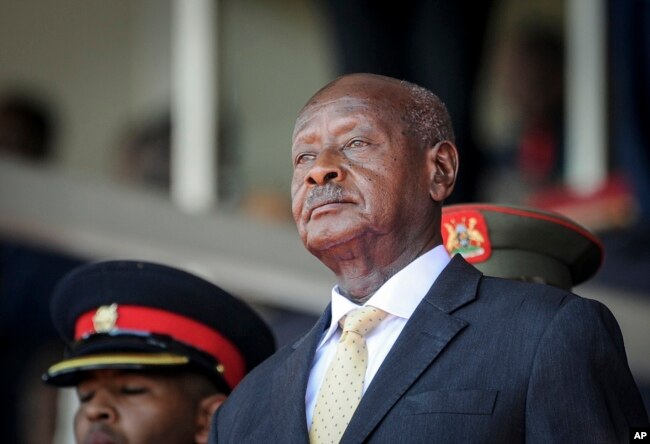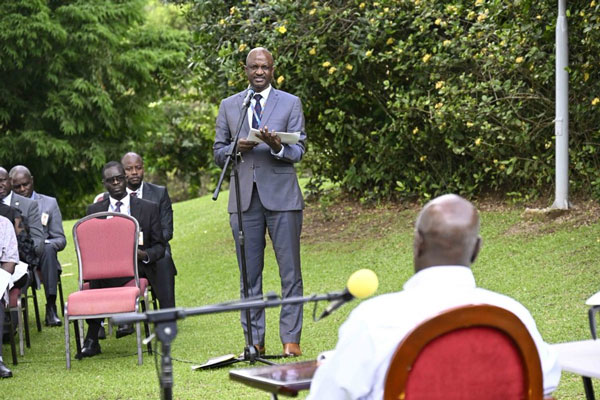
Fnance PS Ramathan Ggoobi briefing President Museveni during the meeting
last year. Uganda claimed Middle Income status two years ago
MUST READ:
When American backed Neo-liberal dictators use corrupted
statistics to lie about development: Where is Museveni getting Uganda's
middle-income status figures from?
https://watchmanafrica.blogspot.com/2022/06/when-american-backed-neo-liberal.html
When the IMF’s Economic hit me continue to
exorbitantly fund Uganda’s Corrupt Neo-liberal regime: IMF’s $120m loan to
Uganda: what aren’t they telling us?
When Uganda’s Wicked neo-liberal system
fails to save even the savers of life : Dr. Anthony Buhangamaiso seeks Shs100m
for life-saving kidney transplant
https://watchmanafrica.blogspot.com/2023/09/when-ugandas-wicked-neo-liberal-system.html
The Criminality of Neo-liberalism in Museveni’s autocratic
Uganda: Thousands of Poor people evicted in Gold Rich Mubende District by the
Military and police
https://watchmanafrica.blogspot.com/2024/03/the-criminality-of-neo-liberalism-in.html
When neo-liberalism turned Ugandans into moving corpses: They
died before leaving for the Middle East: Uganda's economy grows amid inflation
- World Bank
https://watchmanafrica.blogspot.com/2024/02/when-neo-liberalism-turned-ugandans.html
When Museveni’s American Backed Neo-liberal state handed the noble
medical profession to the Dogs: Ugandan medical workers arrested while marching
to parliament to demand better pay and working conditions: Senior doctors join
medical interns strike
https://watchmanafrica.blogspot.com/2021/12/when-musevenis-american-backed-neo.html
UNDP confirms Uganda’s Middle Income status
https://www.independent.co.ug/undp-confirms-ugandas-middle-income-status/
The Independent
March 26, 2024
NEWS ANALYSIS | THE INDEPENDENT | Reports from a
UNDP Human Development Index released last week, that Uganda had
attained middle-income status, has drawn less reactions than the 2022
announcement by government that the country had attained the necessary
indicators.
Experts are of the view that it could be that the announcment has
generated little excitement because Uganda stated that they had actually
achieved this two years ago, or perhaps, the country faces the
unexciting answer to the question, “So what?”.
Nevertheless, the United Nations Development Program (UNDP)
congratulated Uganda on “attaining the indicators”, adding that the task
was now to sustain the progress.
Of interest, the HDI showed that Uganda had made progress , much
better than her regional peers, in improved services, especially health
and education, but also, even though many Ugandans state otherwise, on
personal incomes. It also said Uganda that Uganda had made progress
regarding reducing social inequalities.
Uganda climbed from position 166 in 2021/2022 to 159 in 2023/2024, on
the global index that ranked 193 countries and territories. The
government has defended the two indicators; education and health access
with evidence of physical infrastructure like health centers and
educational institutions built over the years, though the quality of
health and education standards continue to be questioned.
It means, however, that more Ugandans now access medical services and
schools within a certain distance than was the case before. The Human
Development Index (HDI), from which the country reports are drawn, is a
statistical composite index of life expectancy, education (years spent
in school and levels completed) and per capita income indicators.
A country scores a higher level of HDI when the lifespan is higher,
the education level is higher, and the GNI (purchasing power parity) per
capita is higher. HDI is divided into four tiers: very high human
development (0.8-1.0), high human development (0.7-0.79), medium human
development (0.55-.70), and low human development (below 0.55).
In the latest HDI, therefore, the UNDP ranked Uganda with 0.550, just
at the cut-off line, up from the 0.525 score of 2021 which had kept it
in the lower category. “According to the Human Development Report
2023-2024, Uganda has for the first time moved to the category of
‘medium human development’,” UNDP posted on X, repeating what officials
had said during the launch of the report.
Susan Ngongi Namondo, the UNDP Resident Coordinator also said that
the UN Committee on Development Policy (CPD) had announced that Uganda
had attracted the requisite indicators for the lower middle-income
status. It is not mentioned which population and GNI figures the CPD had
assessed to determine Uganda’s status, what the per Capita income was,
and whether it is in agreement with the World Bank assessments.
Middle Income Status is different from the middle Human Development
ranking, as it is dependent on economic indicators based on the value of
goods and services, while the Human Development Index is the value of
human life or standard of living. On the income side, it means that all
Ugandans combined now earn (GNI) more than what they were earning when
the previous report was compiled.
Who got it wrong?GNI, which refers to the total incomes of
nationals within and out of the country minus the incomes of foreigners
resident in the country, is now the World Bank’s preferred method of
classification of economies as opposed to GDP (a monetary measure of the
market value of all the final goods and services produced in a specific
period by a country).
The two measures usually offer almost the same values, but in 2022,
when Uganda National Bureau of Statistics (UBoS) announced a GDP Per
Capita of more than 1,046 dollars enough to put the country in the lower
middle-income bracket), the World Bank said that its calculations,
based on GNI showed a far different picture of 840 dollars per person.
UBOS based its calculations on the financial year 2021–2022, while the
World Bank used the calendar year 2021.
There were also differences in the population figures at the time,
though both used the 2002 and 2014 national census results to make their
2021 estimates. However, based on the UN estimation factors, the World
Bank adjusted this data upwards based on post-census surveys, by about
2.3 million people.
Who cares?
In 2021, the government reporter in the National Household
Survey, that 15.5 million Ugandans (a third of the population) were in
the middle-income status, which indicator, even if it could be disputed,
made more sense of incomes as a show of national transformation.
According to the World Bank in 2022, Africa’s richest countries by
GNI per capita were Seychelles (the only high-income economy on the
continent), Mauritius, Gabon, Botswana, Libya South Africa, and
Equatorial Guinea, all with GNI above 5,000 dollars per person.
This also came as countries were suffering the effects of COVID-19
which had seen more people fall below the poverty line. Nevertheless, it
gives a glimpse of what to pick from a country’s Per Capita Income and
the economic status or classification.
Based on the 2022 figures, for example, Equatorial Guinea, one of the
richest countries on the continent by GDP, GNP, and Per Capita Income
due to its vast petroleum revenues, is also one of the poorest on the
continent. The World Bank shows that 76 percent of the Equatorial
Guineans live below the poverty line, much like 55.4 percent of South
Africans.
At the same period, the Bank said the poverty levels in Uganda, which
had declined to 30 percent before the pandemic was estimated between 30
and 35 percent of the population. So, the class of a country by income
does not necessarily mean a better or worse standard of living, as the
wealth of the nation may as well be held by a very small minority.
Whether or not to celebrate
Under its low-income country status, Uganda benefits from special
development programs with development partners, such as trade and
economic agreements with some countries and blocs, which are recognised
by the World Trade Organisation (WTO).
Among them is the All But Arms trade deal under which the European
Union allows ports from Uganda quota-free and tariff-free. Such
preferential treatments do not apply to middle-income countries and
Uganda will have to forfeit them.
Jan Sadek, the Head of EU Delegation in Uganda said as Uganda moves
towards achieving the status, it should focus on signing the EU-East
African Community Economic Partnership Agreement to avoid trade
disruptions. This was also hinted on by UNDP’s Ms Namondo. “It will
cause short-term disruptions in the budget. Some things will disappear,”
she said urging for proper planning for this shift.
****
URN
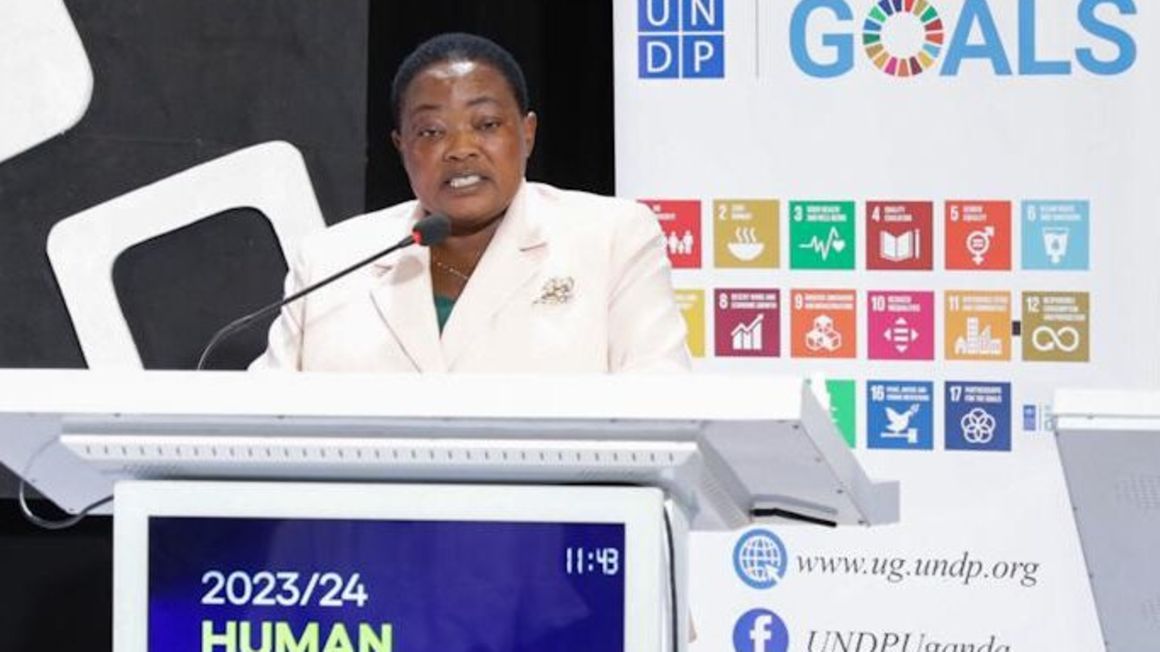
UNDP's Human Development Report: Uganda ranks second in East Africa
https://www.ntv.co.ug/ug/news/national/undp-s-human-development-report-uganda-ranks-second-in-east-africa-4563732
Wednesday March 20 2024
By Sudhir Byaruhanga
The United Nations Development Program (UNDP) presented its latest
Human Development Report for 2023/24 at Makerere University today. The
report highlights Uganda's significant strides in improving the
well-being of its citizens, positioning it as the second-highest
performer in the East African region, trailing only behind Kenya.
Prime
Minister Robina Nabbanja, the guest of honor at the event, reaffirmed
the government's commitment to enhancing service delivery, underscoring
its dedication to national development.
However, questions have arisen regarding the criteria used by UNDP to
elevate Uganda's ranking, particularly in light of the country's ongoing
challenges with corruption.
Despite these concerns, the report points out specific areas where
Uganda must direct its improvement efforts to sustain progress.
The
UNDP Human Development Report takes a holistic approach, assessing
countries based on various human development metrics rather than just
income per capita. Uganda's placement in the 159th position out of 193
countries reflects this comprehensive evaluation.

2023/2024 UN Human Development Report in Pictures
https://www.newvision.co.ug/category/news/202324-un-human-development-index-report-laun-NV_184005
Uganda achieves lower-middle income status,
says UN report
https://www.monitor.co.ug/uganda/news/national/uganda-achieves-lower-middle-income-status-says-un-report-4563794
MUST READ:
When health is not a
human right in Neo-liberal Uganda : Uganda Doctors go on strike leaving
patients stranded : When a senior Ugandan consultant doctor earns about Shs 3.4
million, consultant Shs 2.6 million, and a medical officer Shs 1.1 million as a
Member of Parliament earns over 24 million
http://watchmanafrica.blogspot.ug/2017/11/when-health-is-not-human-right-in-neo.html
When the right to
health in American Neo-liberal dictatorships goes to the dogs: Uganda’s only
cancer machine goes bonkers: Can you Imagine one machine in a country with 40
million people ???
http://watchmanafrica.blogspot.com/2018/09/when-right-to-health-in-american-neo.html
Center for Health, Human Rights and Development (CEHURD)
wins a victory against Uganda’s Neo-liberal State : Gov't fined Shs 310m over
death of two pregnant women 10 years ago: We are too poor to fund health but
too rich to spend on unclassified military expenditure: Judges can no longer
deny Ugandans the right to health by hiding under the so called political
doctrine
https://watchmanafrica.blogspot.com/2020/08/center-for-health-human-rights-and.html
When utterances of
African leaders make God laugh: “Am now 68 years and one of the things I don’t
have a budget for is sickness’’. He explained that he no longer shook hands as
a precaution against the deadly Ebola virus. Museveni
http://watchmanafrica.blogspot.com/2012/09/when-utterances-of-african-leaders-make.html
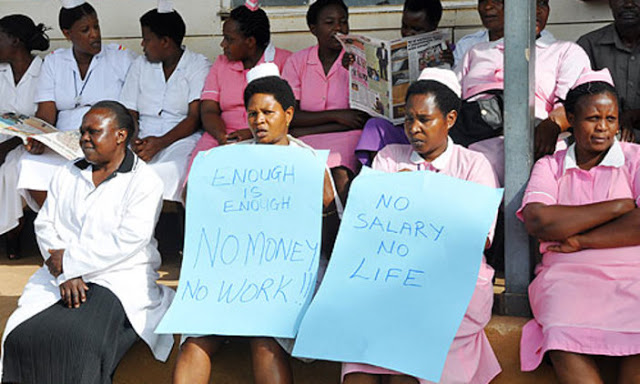
When the USA client state
rots to the core: Health centres in Uganda suffer as money is diverted to pay
for GAVI fraud: mean while Like Kaboyo, Muhwezi, Kamugisha have been set free
by chief magistrate IRENE AKANKWASA
http://watchmanafrica.blogspot.com/2012/08/when-usa-client-state-rots-to-core_1.html
The effect of Brain Drain
on Uganda’s Health Sector: No applicants yet for 36 key Mulago vacancies
http://watchmanafrica.blogspot.com/2012/07/effect-of-brain-drain-on-ugandas-health.html
For God and my country or For my stomach, my family, relatives
and friends: The paradox of Museveni’s 2 billion Car amidst a dead health
sector, increasing poverty , youth unemployment and struggling economy
https://watchmanafrica.blogspot.com/search?q=health

